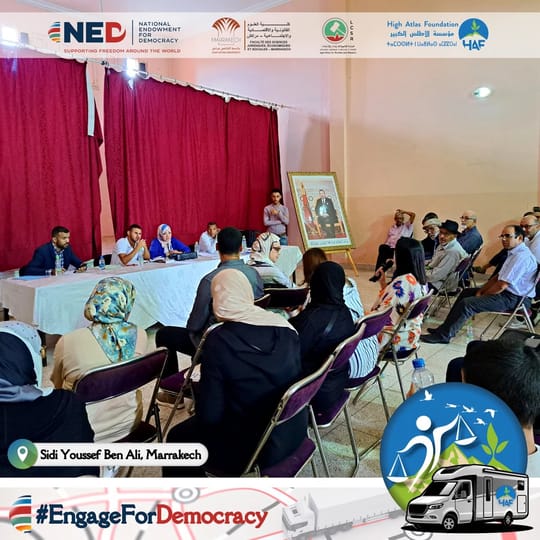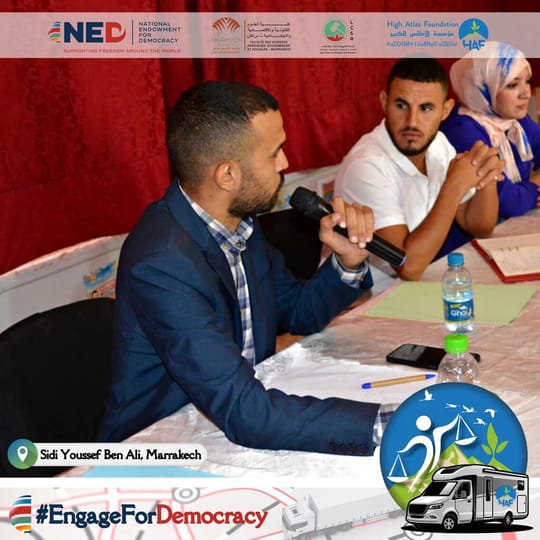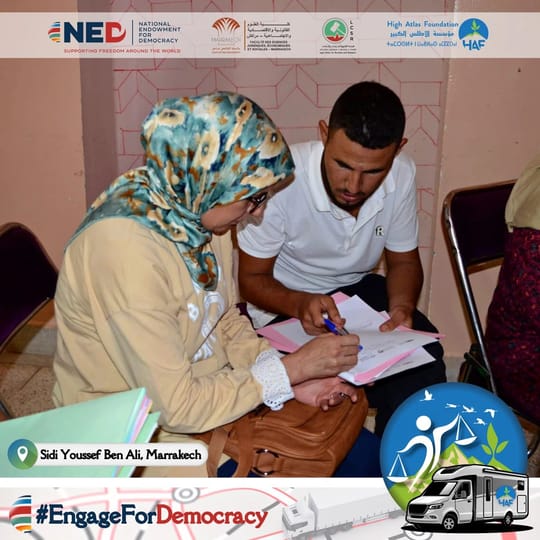Mobile Clinic Addresses Property Disputes in Sidi Youssef Ben Ali, Marrakech

In line with its objectives, the High Atlas Foundation, in partnership with the Legal Clinic at the Faculty of Law, Economics, and Social Sciences in Marrakech, and in collaboration with our partners CSOs, the International Academy for Training and Support, organized an interactive meeting as part of the project to Promoting Civil Society University Engagement funded by the National Endowment for Democracy. This meeting took place on Sunday, September 3, 2023, at the Dar Al-Jamaiat in the New District of Sidi Youssef Ben Ali.
The Mobile Legal Clinic provided a new opportunity to bring legal assistance closer to vulnerable groups by visiting various locations in the Marrakech-Safi region. The event in Sidi Youssef Ben Ali was attended by various groups seeking free legal consultations, which aimed to promote legal awareness, knowledge of rights, and responsibilities within the community. The meeting primarily focused on addressing the real estate fragmentation issue, particularly the "Bustan Al Wahat in Sidi Yousef Ben Ali," along with various legal aspects. Law students from different specialties participated in the event.
In the field of insurance, presented by student Yassine Belkhadir, the topic was addressed by listening to the residents' concerns and raising several questions. These questions were answered within the session, especially those related to vehicle insurance, including property insurance. The legal consultations covered topics such as how to activate the contract and the extent of insurance coverage. The key question revolved around insurance coverage during accidents or similar situations.
In the field of real estate, students Mohammed Bahajjou, Ayoub Ait Yahia, and Sayf-Eddine Jmahri tackled an issue of utmost importance related to real estate and its challenges. As known to all, real estate concerns people before their birth, during their lives, and after their passing. Real estate plays a pivotal role as it is the cornerstone of the transition to property.
This initiative deserves broader implementation in the future as the community faces a complex legal and practical problem. The victims numbered around 300 individuals who purchased apartments in Bustan Al Wahat in Sidi Youssef Ben Ali. Each case is unique given the varied circumstances of each beneficiary. Law students from the Legal Clinic specializing in real estate helped to establish a legal framework for the beneficiaries regarding their rights and responsibilities.

Legal clinic students while framing legal topics - Photo Credit: HAF Staff
The core issue revolves around the non-delivery of apartments to the beneficiaries. The meeting began with an open discussion involving the beneficiaries, relevant stakeholders, and those with vested interests in diagnosing the problem, understanding its development stages, and defining the legal aspects. It started by highlighting the legal foundations, including Law 107.12 regulating properties under construction and other related texts, such as Laws 25.90 and 12.90 governing development and property divisions, as well as the Property Rights Code. It's noteworthy that since June 2011, customary contracts in real estate have been eliminated, and only authorized entities, including notaries, agents, and lawyers allowed to appear before the Court of Cassation, can draft contracts. Various other conditions were detailed in Article 4 of the same Code.
Additionally, the contracts that bind property developers and beneficiaries must include a set of legal conditions outlined in the specifications outlined in Law 107.12, which regulates properties under construction. The issue of changing the legal status of the property by the developer and its impact on the rights of consumers was also discussed. Various questions were posed by the community, especially considering the large number of beneficiaries, approximately 300 individuals. The concern lies in the relationship that ties them to the property developer.
➢ Some of the legal questions raised were as follows:
● Is it legal to demand expenses related to the file from the property developer?
● Is the beneficiary or property buyer obliged to pay the syndicate fees proposed by the property developer, and can they compel another beneficiary to resort to a specific notary?
● Is the right of withdrawal possible, and can it be done after the completion of the work?
● What protection does the customary contract offer?
● What legal procedures can be employed to protect the property rights of beneficiaries?
● What types of compensation can be claimed for delivery delays?
● What is meant by a precautionary constraint, and what are its risks?
● Can one beneficiary transfer their rights to another party, and how can this be done?
● Is the contract concluded between the property developer and the beneficiaries legally valid?
● Can the property developer send the funds paid by the beneficiary through a judicial representative?
● Does the report prepared by the beneficiaries with the property developer have any protective power, and what are its limits?
● Can the terms of the specifications be amended during the sale of the property under construction?
The meeting addressed the issue of property fragmentation that has not yet been delivered to the beneficiaries. It's worth noting that the issue of the properties in Bustan Al Wahat in Sidi Youssef Ben Ali is currently under discussion with several responsible authorities for urban development and housing, including a representative of the local authorities.
Regarding the legal status of these restrictions in the land registry, it was explained that property rights remain subject to the outcome of these precautionary constraints. The flexibility to act on the property is present as long as the precautionary constraint registered in the land registry remains unresolved. The power of this precautionary constraint lies in the fact that at any moment, the beneficiary could face a judicial ruling to evacuate the property since the holder of the constraint is the owner of the property and all its contents, even retroactively.
The meeting saw enthusiastic communication with the beneficiaries and the provision of answers to all raised questions, along with detailed explanations and potential solutions. Several recommendations were made, such as proposing the resolution of disputes through arbitration. Other recommendations included contacting various official bodies, such as the main representative of the Ministry of Housing and Urban Development or one of its deputies, monitoring the developments of the case that concerns the community within the Department of Urban Planning in the Marrakech Safi region, communicating with the beneficiaries regarding any developments in their case. The meeting also advised avoiding recourse to the judiciary.

Legal clinic students record beneficiary information - Photo Credit: HAF Staff